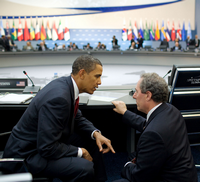President Barack Obama's performance at the United Nations last week was widely hailed -- and condemned -- as a clear departure from that of his predecessor, George W. Bush. His most telling statement spoke volumes about the limits of U.S. power in an interdependent world: "Those who used to chastise America for acting alone in the world cannot now stand by and wait for America to solve the world's problems alone." Subtext? Atlas has put down the heavy globe and has neither the intention nor the wherewithal to pick it up again.
If that makes for an uncertain age, it's an uncertainty limited by the clear rules that define defense ("mutually-assured destruction" being the most famous and stable) and an emerging body of rules (expanded each time some shared crisis perturbs our collective system) that defines security among the connected regions of this world. The prospects for great-power war within what I call globalization's Functioning Core -- old West, rising East and key southern pillars -- are nil, due to the "financial balance of terror" (Lawrence Summers's term) that has dramatically eclipsed the perceived threat of the previous kinetic version.
You want proof? We now live in a world governed more by the G-20's consensus than by the U.N. Security Council's fractious debates. When the "20 with the money" -- as I call the grouping -- reach a decision, a two-thirds global super-majority has spoken. Get used to it.

